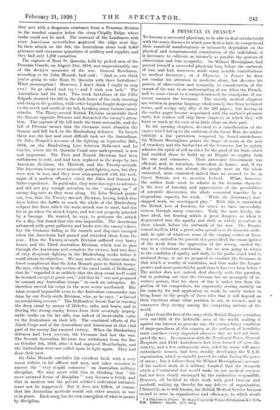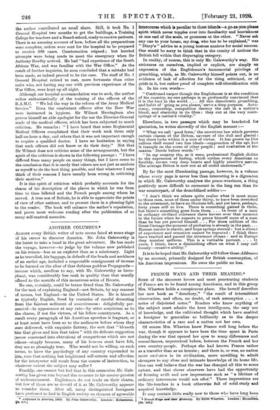A PHYSICIAN IN FRANCE.* To become a successful physician, to
be able to deal satisfactorily with the many diseases to which poor flesh is heir, to comprehend their manifold manifestations so intimately dependent on the physical and temperamental constitution of the individual, it is necessary to cultivate as intensely as possible the powers of observation and true sympathy. Sir 'Wilmot Herringham had proved himself a successful physician long before the outbreak of war, and had, moreover, made many notable contributions to medical literature ; in A Physician in France ho does not confine his attention to medicine alone, but devotes his powers of observation and sympathy to consideration of the causes of the war, to an understanding of our Allies the French, and to some extent to a comprehension of the standpoint of our recent enemies the Germans. The strictly medical chapters are written in popular language wholesomely free from technical terms, and occupy only fifty of the 293 pages ; but having in the earlier pages become acquainted with the author's pleasant style, few readers will skip these chapters, in which they will learn so much at the cost of so little effort on their part.
In the opening chapters, devoted to a consideration of the causes which led up to the outbreak of the Great War, the author exhibits a fine patriotism tempered by broad-mindedness. Sir Wilmot Herringliam points the finger of scorn at the acts of treachery and the barbarities of the Germans, but he rightly admires the spirit of self-sacrifice for the good of the State which had enabled them to build up an Empire so mighty both for war and commerce. Their autocratic Government was efficient, and, in intention, benevolent at home ; and, if the ideal of freedom was absent, the people were on the whole contented, more contented indeed than we seemed to be in Great Britain, not to mention Ireland. What, however, the author finds most to admire in the German character is the love of learning and appreciation of the possibilities of scientific discoveries, the whole cemented together by a stupendous capacity for work. " While she [Germany] wor- shipped work, we worshipped play." With this is contrasted the British love of freedom, for which we have successfully striven through many centuries. Truly the more lovely, the finer ideal, but bearing within it great dangers, as when it degenerated into the apathy and sloth so widely prevalent in these islands before the outbreak of the war. The Empire roused itself in 1914, a great calm spread over its domestic strife, and, in spite of whatever some of the carping critics at home may aver, united in the pursuit of a great ideal, the emancipation of the weak from the oppression of the strong, carried the war to a victorious conclusion. Are we now going to return to the condition of apathy and sloth, to the paths which lead to national decay, or are we prepared to emulate the Germans in that which is worthy of emulation, and thus make the Empire greater and more powerful for good than it has ever been before ? The author does not, indeed, deal directly with this question, but in pointing out that the German has no monopoly of in- ventive genius, that his share of this is rather less than the portion of his competitors, his superiority resting entirely on his capacity for and application to work, he surely wishes to bring home to the people of these isles that it will depend on their exertions alone what position in art, in science, and in commerce they occupy among the competing nations of the world.
Apart from the fact of the sway of the British Empire extending over one-fifth of the habitable area of the world, making it against our interest to provoke war, the extraordinary condition of unpreparedness of this country at the outbreak of hostilities must convince every impartial observer that we had not insti- gated the war. In connexion with the Territorial Force, General Hospitals and Field Ambulances had been formed all over the country, and a few enthusiastic men, aided by many still more enthusiastic women, had been steadily developing the V.A.D. organization, which so signally proved its value during the years of stress ; but it follows from Sir Wilmot Herringham's account of his earliest work at a military hospital that the demands which a Continental war would make on our medical services had not been clearly envisaged by the authorities responsible. However, all buckled to their work with good humour and goodwill, making up thereby for any defects of organization. Ultimately, as is well known, the British Medical Service became second to none in organization and efficiency, to which result
• A Physician in France. By Major-General Sir Wilmot Ilerringham, C.B. London : Arnold. 115s. net.] the author contributed no small share. Still, it took No. 1 General Hospital two months to get the buildings, a Training College for teachers and a Board-school, ready to receive patients. There is an amusing account of how, before all the preparations were complete, orders were sent for the hospital to be prepared to receive 500 cases. Consternation reigned ; but hurried attempts were being made to meet the emergency when Sir Anthony Bowlby arrived. He had "had experience of the South African War, and was familiar with the War Office." As the result of further inquiries, he soon concluded that a mistake had been made, as indeed proved to be the case. The staff of No. 1 General Hospital retired to rest, more fortunate than other units who, not having any one with previous experience of the War Office, were kept up all night.
Although our hospital accommodation was to seek, the author writes enthusiastically of the training of the officers of the R.A.M.C. " We led the way in the reform of the Army Medical Service." Even the combatant officers after the Boer War were instructed in hygiene. Sir Wilmot Herringham also proves himself an able apologist for the use the Director-General made of the medical officers, which has been subjected to much criticism. He remarks : " I have heard that some Regimental Medical Officers complained that their work took them only half-an-hour a day, and others that it was not important enough to require a qualified doctor. I have no hesitation in saying that such officers did not know or do their duty." Not that Sir Wilmot does not criticize some of the arrangements, but the spirit of the criticism is shown in the following passage : " I have differed from many people on many things, but I have come to the conclusion that it is rarely that others are not just as anxious as myself to do the best thing possible, and that whatever I may think of their reasons I have usually been wrong in criticizing their motives."
It is this spirit of criticism which probably accounts for the charm of his description of the places in which he was from time to time billeted and the French people among whom he moved. A true son of Britain, he is able to appreciate the points of view of other nations, and to present them in a pleasing light to the reader. The book will enhance the author's reputation, and prove most welcome reading after the publication of so many self-centred memoirs.



































 Previous page
Previous page